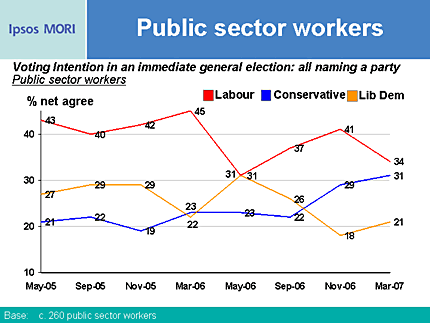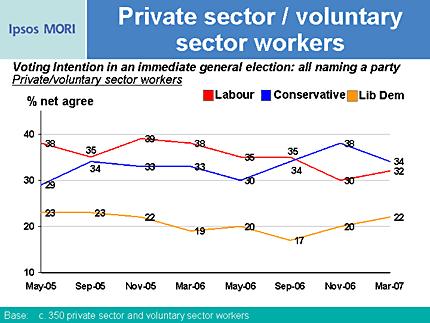Political Commentary - Are Public Sector Workers Deserting Labour?
In recent months there have been some high-profile controversies involving the relationship between public sector workers and the Labour Government. The most recent of these involved below-inflation pay rises for public sector workers, as well as opposition to the Government's public sector reforms -- particularly with the NHS.
Indeed, we at Ipsos have generally been finding evidence of increasing disgruntlement among public sector workers in comparison with their private sector counterparts. In our latest Workers' Index 19% of public sector workers are critical of their organisation as an employer, compared with 12% of private sector workers. Furthermore, the faith of public sector workers in the leadership abilities of senior managers has declined, with around a quarter thinking that senior managers in the public sector do not have a clear vision of where the organisation is going (see:160Workers' Index for more details).
It is therefore tempting to gauge the political impact of such issues. In other words, are public sector workers remaining loyal to the Labour Party in spite of recent difficulties? And if not, which of the other parties stand to benefit?
Research conducted just after the General Election in May 2005 goes some way to outlining the allegiance many public sector workers have towards Labour. Then, over two in five public sector workers intended to vote Labour, which was double the proportion who intended to vote Conservative, as well as being over fifteen percentage points clear of the Lib Dems. Among private and voluntary workers, Labour was still ahead but the gap was much closer between them and the Conservatives.
In subsequent months, despite a experiencing a blip in the aftermath of relatively disappointing local election results in May '06, Labour's lead among those who work in the public sector broadly remained intact.
However, recent months have seen something of a transformation -- with the Conservatives reducing their fifteen point deficit among public sector workers in September last year into a three point deficit now.
PLEASE NOTE: These voting figures are based on all giving a voting intention rather than those saying they are 'certain to vote'.

Furthermore, in May '06 when Labour's support among public sector workers had previously declined, it was the Lib Dems that benefited. But more recently it appears to be the Conservatives who are gaining from any disenchantment among those who work in the public sector -- is this evidence that David Cameron's strategy of appealing beyond the Conservative's core vote is beginning to succeed?

Labour's support among private sector voters has also declined over time (although not at the same rate as among public sector voters). From being nine points behind after the 2005 General Election, the Conservatives have developed a lead over Labour among private sector workers of two percentage points (and this was an eight point lead at the end of last year).
Any disenchantment of public sector workers will be a cause for concern for the Government. In comparing voting intention of public sector workers with that of the public as a whole, our data shows that when Labour's vote among public sector workers goes down, Labour do badly overall (please see:160Voting Intention in Great Britain for our voting intention figures over time). This to some extent will reflect the traditional status of public sector workers as being among Labour's 'core' vote, but it may also reflect the fact that, as Ipsos often finds, staff advocacy in any organisation can have a considerable impact on the wider reputation of that organisation. This applies to the public services as much as any other organisation -- and any scepticism of public sector staff could well impact negatively on the public's wider confidence in the Government's ability to deliver and improve public services.
Ipsos interviews c.1,000 adults aged 18+ across Great Britain every quarter, by telephone. Results are weighted to the profile of the population.
Graham Keilloh is Deputy Head of Political Research at Ipsos



